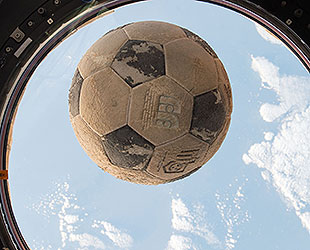
To listen to today’s reflection as a podcast, click here
None of the seven astronauts aboard the Space Shuttle Challenger survived the explosion that tore it apart just 73 seconds after launch.
But something traveling aboard the shuttle did survive.
Workers tasked with recovering fragments of the ship discovered a black duffel bag floating in the Atlantic.
Inside was a soccer ball. It had been brought aboard by 39-year-old veteran astronaut Ellison Onizuka, the first Asian-American and first Hawaiian ever to travel in space.
Onizuka was an assistant coach for the girls soccer team at Houston’s Clear Lake High School, just four miles from the Johnson Space Center. His daughter Janelle played for the Lady Falcons.
Given the chance to carry something personal into space, El chose to take a soccer ball that had been signed by everyone on the team. The words “Good Luck, Shuttle Crew!” were plainly written on one of its hexagonal surfaces. He slipped it into a duffel bag and stored it in his private locker.
On January 28, 1986, what should have been a joyful day became a nightmare.
El’s wife Lorna remembers being brought into a conference room, where she huddled with members of the other astronaut families. NASA officials somberly announced that the crew had been lost. Lorna fainted. As she slid down the wall, she hit the light switch. The room went dark.
“At that very moment,” she said later, “all the lights went out because all the lights did go out in all of us.”
No one expected anything like a soccer ball to be recovered from the debris. The Onizukas decided to give it back to Clear Lake, where Janelle tearfully presented it in a ceremony that was supposed to be have been led by her dad.
For 30 years it sat in a display case in the hallway, gradually fading from the community’s collective memory.
But in October 2016, another astronaut whose daughter attended Clear Lake – Colonel Shane Kimbrough – was given the chance to carry something personal on his flight to the International Space Station. He asked permission to take the soccer ball.
As Tonya Malinowski reported in a story that first aired on ESPN, the ball spent 173 days aboard the space station. You can see it floating weightlessly in the picture above by one of the ISS windows. It orbited the Earth nearly 3,000 times, finally coming home on April 10, 2017.
Lorna was “happy, gratified, thankful” that the ball had completed its original mission. Now it sits in a more prominent display case at Clear Lake, passed every day by thousands of students, including Ellison’s grandchildren.
When a story has been interrupted, we feel restless until it’s completed.
This is an ancient longing. Someone dies too young. Or too soon. A deep dream is deferred. This world doesn’t feel big enough, and life never seems to last long enough.
Why does everyone feel this way?
It seems that God has placed within us a kind of homing beacon – a reminder that our stories were made to straddle two worlds. We ache for what was never completed in this life – an ache that can only be addressed if life doesn’t end in a cemetery.
That’s one of the primary takeaways from Easter.
When Jesus died, the lights seemed to go out.
But then a remarkable rumor began to spread: Jesus had not been conquered by Death. He had gone one-on-one with humanity’s greatest enemy and won. Followers of Jesus live in the confidence that even when something seems incomplete, interrupted, or tragically cut short, it will one day be made right by the God who rules both this world and the next.
If you own a passport, you may have noticed the quotes printed at the top of the pages.
There’s an excerpt from the Declaration of Independence, along with selected words from John F. Kennedy, George Washington, Teddy Roosevelt, and others.
Towards the end of your passport, at the top of pages 22 and 23 in the latest publication, are these words from Ellison Onizuka: “Every generation has the obligation to free men’s minds for a look at new worlds…to look out from a higher plateau than the last generation.”
By God’s grace, our minds can be freed to see farther than we’ve ever seen before.
We live in the expectation that one day life’s mysteries will become plain.
“For now we see only a reflection as in a mirror, then [in the next world] we shall see face to face. Now I know in part; then I shall know fully, even as I am fully known” (I Corinthians 13:12).
